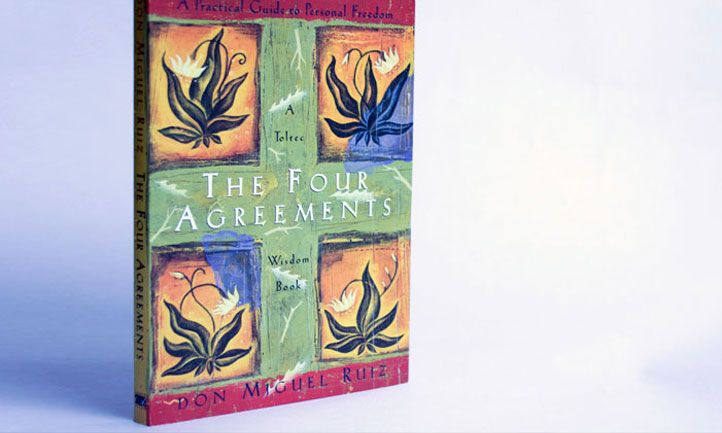Book Review: The Four Agreements
Author: Ashley Rao
Spiritual teacher Miguel Ruiz promotes healing and transformation through ancient wisdom of the Toltec culture, a people native to Central America. In his book, “The Four Agreements,” Ruiz outlines “A Practical Guide to Personal Freedom.”

Ruiz contends that a wall of fog distorts our perception of who we are: “It is as if we live in the middle of a fog that doesn’t let us see any further than our own nose.” This fog, he explains, is formed by unexamined agreements we’ve established with ourselves and others – beliefs about who we are and who we should be and masks we’ve put on to hide our perceived imperfections.
Those of us who are grieving understand this sentiment all too well – grief can feel like a heavy fog, clouding our minds, numbing our senses, obscuring our identity and the direction we feel we should take. We know the weight of others’ expectations. We’ve grown accustomed to donning our “I’m okay” masks even when our hearts are broken into a thousand tender pieces.
Regardless of where we land on the spiritual spectrum - from skeptic to believer and across religious creeds – the application of Ruiz’s tenets offers opportunities for transformation within our journey through grief.
1. Be Impeccable with Your Word
The first agreement addresses the power of the language we use – in spoken word as well as thought. “The word is a force; it is the power you have to express and communicate, to think and thereby to create the events in your life.” Ruiz warns us to be careful to use this force for good, rather than to destroy.
2. Don’t Take Anything Personally
Ruiz’s second agreement helps to guide us in our interactions with others: “Whatever people do, feel, think or say, don’t take it personally.” Ruiz explains that the way others speak and act are projections of their own reality rather than truly being about us. He invites us to let go of the pain, anger and envy we attach to others’ actions and reminds us that we can only be responsible for ourselves – not the choices or actions of others.
3. Don’t Make Assumptions
The third agreement calls us to examine the negative ways our assumptions affect our relationships. “We make the assumption that everyone sees life the way we do. We assume that others think the way we think, feel the way we feel, judge the way we judge,” but in reality our perspectives are as unique as our fingerprints. Ruiz proposes that accepting that our assumptions about others as truth creates misunderstandings, conflict and unnecessary drama in our lives. He encourages us to change this by having courage to ask questions and to communicate clearly.
4. Always Do Your Best
Ruiz’s final agreement calls us to put forth our very best effort into our language and relationships - into whatever it is that we do. Our best effort will vary from one day to the next; stepping into responsibility for our best (no more and no less) challenges us to live life intensely, offers us freedom from unrealistic standards and creates a step-by-step map towards healing in our journey. “If you do your best always, over and over again, you will become a master of transformation. Practice makes the master. By doing your best you become a master.”
From the pen of…
Ashley Rao, project manager for TAPS Empowerment Weeks of Renewal, has found healing and transformation within TAPS since her husband Army Staff Sgt. Jack Martin died in 2009. Her passion for survivors and experiences working with women who’ve experienced trauma, as a hospice nurse and as a surviving spouse, provide the foundation for TAPS Empowerment programming.
